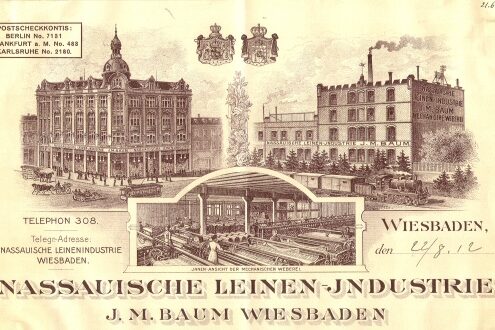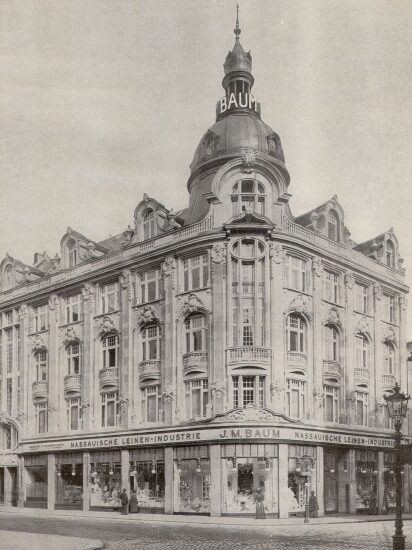Nassau Linen Industry Joseph Maier Baum
Renowned Wiesbaden textile company 1840-1957. Founded as a small business in rural Schierstein, it developed into a major industrial company in Wiesbaden. Due to economic difficulties after the First World War, company headquarters moved to Frankfurt.
Around 1900, the Wiesbaden textile company was one of the largest and most successful businesses in the city. The Jewish merchant Joseph Maier (1813-1874) had founded it as a small manufacturing business in the fishing village of Schierstein in 1840. However, the business of Joseph Maier, who took the surname "Baum" following the decree of Duke Adolf in 1842, could not secure the livelihood of the family of eight in the long term.
As a result, the merchant Baum decided to move to the up-and-coming spa town of Wiesbaden in 1863, where he acquired citizenship in 1864. Here, his products met with greater demand from the numerous wealthy spa guests. In addition to fabrics and textiles for the upper classes, Baum also sold military equipment. The production of fabrics in the correctional facility in the former Eberbach monastery and later in the prison in Dietz enabled him to offer favorable prices. The increasing demand soon made the first business premises in Neugasse 7 too small, so that Joseph Maier Baum acquired a larger house in Kirchgasse/corner of Friedrichstraße in 1870/71.
After his sudden death in 1874, three of his sons took over the business and continued to run it successfully: Moritz Baum (1840-1907), Salomon Baum (1844-1899) and Hermann Baum (senior, 1850-1914). They sold their fabrics and textiles on the international market.
When the next generational change was imminent towards the end of the 19th century, only Salomon Baum's sons, Joseph and Hermann, showed any interest in continuing the textile business. In 1900, Joseph Baum (1874-1917) became the sole partner, followed three years later by his younger brother Hermann (junior, 1877-1923). They continued to develop the company into an industrial enterprise with its own mechanical weaving mill, which was given the name "Nassauische Leineindustrie Joseph Maier Baum". After the house in Kirchgasse acquired in 1870 had also become too small, the owners had a larger representative building erected on the same site.
The outbreak of the First World War, the absence of spa guests, the occupation of the town and the unstable political situation led to major economic difficulties, which were further exacerbated by the death of Joseph Baum in 1917. As the sole owner, Hermann Baum (junior) then leased the large business premises in Kirchgasse in 1919 and concentrated on wholesale and the production of textiles. In 1921, he moved the company headquarters to Frankfurt, where he died in 1923. His widow, Irene Baum, née Herxheimer, initially continued to run the company for three years until she sold it to two Jewish merchants from Frankfurt in 1926.
The boycott measures and persecution by the National Socialists forced the sale of the company at the beginning of 1939 for far less than its value. The previous owners were forced to emigrate. The company, based in Frankfurt, then continued to exist as "Nassauische Leinenindustrie Erwin Kuch" with various partners until insolvency proceedings in 1957, when it was deleted from the commercial register.
Literature
The Jewish textile entrepreneur Joseph Maier Baum and his company "Nassauische Leinenindustrie" in Wiesbaden. In: Nassauische Annalen, Verein für Nassauische Altertumskunde und Geschichtsforschung (ed.), 120, Wiesbaden 2009.

